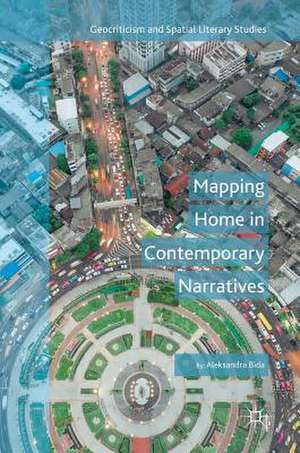Mapping Home in Contemporary Narratives: Geocriticism and Spatial Literary Studies
Autor Aleksandra Bidaen Limba Engleză Hardback – 2 oct 2018
| Toate formatele și edițiile | Preț | Express |
|---|---|---|
| Paperback (1) | 383.50 lei 6-8 săpt. | |
| Springer International Publishing – 25 ian 2019 | 383.50 lei 6-8 săpt. | |
| Hardback (1) | 489.48 lei 6-8 săpt. | |
| Springer International Publishing – 2 oct 2018 | 489.48 lei 6-8 săpt. |
Din seria Geocriticism and Spatial Literary Studies
- 20%
 Preț: 628.30 lei
Preț: 628.30 lei - 9%
 Preț: 764.94 lei
Preț: 764.94 lei - 18%
 Preț: 783.05 lei
Preț: 783.05 lei - 15%
 Preț: 696.50 lei
Preț: 696.50 lei - 18%
 Preț: 787.29 lei
Preț: 787.29 lei - 9%
 Preț: 635.07 lei
Preț: 635.07 lei -
 Preț: 215.71 lei
Preț: 215.71 lei - 15%
 Preț: 465.66 lei
Preț: 465.66 lei -
 Preț: 390.84 lei
Preț: 390.84 lei - 15%
 Preț: 470.06 lei
Preț: 470.06 lei - 15%
 Preț: 471.03 lei
Preț: 471.03 lei - 15%
 Preț: 701.90 lei
Preț: 701.90 lei - 18%
 Preț: 736.16 lei
Preț: 736.16 lei - 15%
 Preț: 581.98 lei
Preț: 581.98 lei -
 Preț: 382.36 lei
Preț: 382.36 lei -
 Preț: 479.47 lei
Preț: 479.47 lei -
 Preț: 390.84 lei
Preț: 390.84 lei - 15%
 Preț: 694.83 lei
Preț: 694.83 lei -
 Preț: 387.75 lei
Preț: 387.75 lei -
 Preț: 386.81 lei
Preț: 386.81 lei - 15%
 Preț: 642.51 lei
Preț: 642.51 lei - 15%
 Preț: 642.03 lei
Preț: 642.03 lei - 15%
 Preț: 692.41 lei
Preț: 692.41 lei - 15%
 Preț: 495.33 lei
Preț: 495.33 lei -
 Preț: 388.72 lei
Preț: 388.72 lei -
 Preț: 385.62 lei
Preț: 385.62 lei - 15%
 Preț: 694.87 lei
Preț: 694.87 lei - 15%
 Preț: 529.60 lei
Preț: 529.60 lei -
 Preț: 389.70 lei
Preț: 389.70 lei -
 Preț: 453.60 lei
Preț: 453.60 lei -
 Preț: 386.81 lei
Preț: 386.81 lei - 15%
 Preț: 700.29 lei
Preț: 700.29 lei
Preț: 489.48 lei
Nou
Puncte Express: 734
Preț estimativ în valută:
93.66€ • 97.80$ • 77.34£
93.66€ • 97.80$ • 77.34£
Carte tipărită la comandă
Livrare economică 15-29 aprilie
Preluare comenzi: 021 569.72.76
Specificații
ISBN-13: 9783319979663
ISBN-10: 3319979663
Pagini: 192
Ilustrații: XIV, 241 p.
Dimensiuni: 148 x 210 mm
Greutate: 0.46 kg
Ediția:1st ed. 2018
Editura: Springer International Publishing
Colecția Palgrave Macmillan
Seria Geocriticism and Spatial Literary Studies
Locul publicării:Cham, Switzerland
ISBN-10: 3319979663
Pagini: 192
Ilustrații: XIV, 241 p.
Dimensiuni: 148 x 210 mm
Greutate: 0.46 kg
Ediția:1st ed. 2018
Editura: Springer International Publishing
Colecția Palgrave Macmillan
Seria Geocriticism and Spatial Literary Studies
Locul publicării:Cham, Switzerland
Cuprins
1. Introduction.- Chapter 2: Heidegger and "dwelling".- Chapter 3: The labyrinthine home in Mark Z. Danielewski’s House of Leaves.- Chapter 4: Homecoming in Neil Gaiman’s Neverwhere.- Chapter 5: Bauman and “liquid modernity”.- Chapter 6: “Roots” and stability in M. Night Shyamalan’s The Village.- Chapter 7: “Routes” and mobility in Nicolas Dicker’s Nikolski.- Chapter 8: Derrida and “hostipitality”.- Chapter 9: Welcome as house arrest in Lars von Trier’s Dogville.- Chapter 10: “Home safe” in spite of hostility in Wolfgang Becker’s Good Bye, Lenin!.- Chapter 11: Appiah and cultural “contamination”.- Chapter 12: Economic globalization and home in Alejandro González Iñárritu’s Babel.- Chapter 13: Global "at homeness" in David Mitchell's Cloud Atlas and the Wachowskis/Tykwer film.- 14. Conclusion.
Notă biografică
Aleksandra Bida is Contract Lecturer at Ryerson University, Canada. She has a PhD in Communication and Culture from the joint program at Ryerson University and York University in Toronto.
Textul de pe ultima copertă
By offering an analysis of the idea of home across the individual, interpersonal, social, and global scales, Mapping Home aims to show the extent to which self-concept is deeply tied to constructions of home in a globally mobile age. The epistemological link between dwelling as "knowing oneself" and the experience of welcome as key to being able to map "one's place(s) in the world" are examined through Martin Heidegger's concept of dwelling, Zygmunt Bauman's notion of liquid modernity, Jacques Derrida's exploration of hostile hospitality, and Kwame Anthony Appiah's sense of cosmopolitanism as border-crossing conversation. To further explore these ideas, the book draws on multimodal literature and films that span genres, including gothic horror, fantasy and science fiction, thoughtful comedies, and politically nuanced tragedies. The quality that deeply links the texts is their ability to illuminate the stabilities and mobilities through which home not only mediates but also integrates an individual's diverse experiences of belonging in different locations as well as on different geocultural scales—from the intimate "household" to the more abstract "hometown" or "homeland" and beyond.
Caracteristici
Draws on geocritical, spatiality, and mobilities studies Examines the concept of “home” in literature, film, and culture Provides transnational and global perspectives
